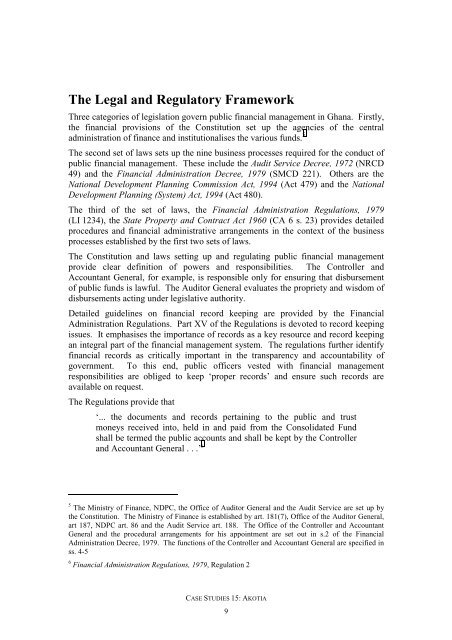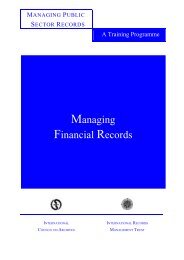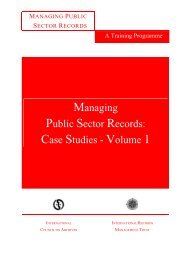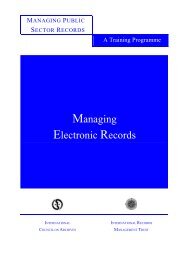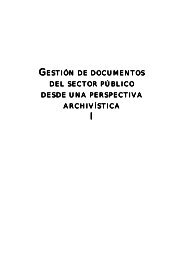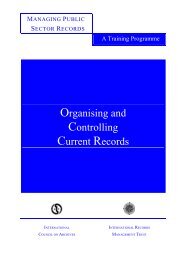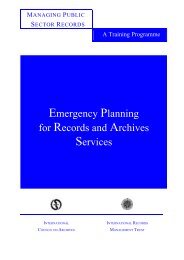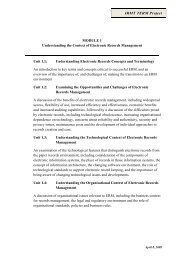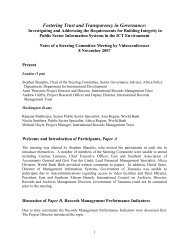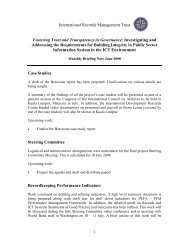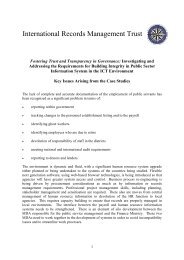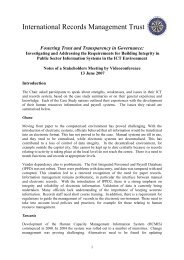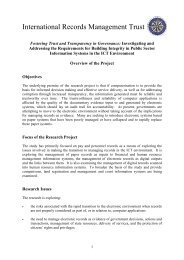managing public sector records: a study programme - International ...
managing public sector records: a study programme - International ...
managing public sector records: a study programme - International ...
Create successful ePaper yourself
Turn your PDF publications into a flip-book with our unique Google optimized e-Paper software.
The Legal and Regulatory Framework<br />
Three categories of legislation govern <strong>public</strong> financial management in Ghana. Firstly,<br />
the financial provisions of the Constitution set up the agencies of the central<br />
administration of finance and institutionalises the various funds. 5<br />
The second set of laws sets up the nine business processes required for the conduct of<br />
<strong>public</strong> financial management. These include the Audit Service Decree, 1972 (NRCD<br />
49) and the Financial Administration Decree, 1979 (SMCD 221). Others are the<br />
National Development Planning Commission Act, 1994 (Act 479) and the National<br />
Development Planning (System) Act, 1994 (Act 480).<br />
The third of the set of laws, the Financial Administration Regulations, 1979<br />
(LI 1234), the State Property and Contract Act 1960 (CA 6 s. 23) provides detailed<br />
procedures and financial administrative arrangements in the context of the business<br />
processes established by the first two sets of laws.<br />
The Constitution and laws setting up and regulating <strong>public</strong> financial management<br />
provide clear definition of powers and responsibilities. The Controller and<br />
Accountant General, for example, is responsible only for ensuring that disbursement<br />
of <strong>public</strong> funds is lawful. The Auditor General evaluates the propriety and wisdom of<br />
disbursements acting under legislative authority.<br />
Detailed guidelines on financial record keeping are provided by the Financial<br />
Administration Regulations. Part XV of the Regulations is devoted to record keeping<br />
issues. It emphasises the importance of <strong>records</strong> as a key resource and record keeping<br />
an integral part of the financial management system. The regulations further identify<br />
financial <strong>records</strong> as critically important in the transparency and accountability of<br />
government. To this end, <strong>public</strong> officers vested with financial management<br />
responsibilities are obliged to keep ‘proper <strong>records</strong>’ and ensure such <strong>records</strong> are<br />
available on request.<br />
The Regulations provide that<br />
‘... the documents and <strong>records</strong> pertaining to the <strong>public</strong> and trust<br />
moneys received into, held in and paid from the Consolidated Fund<br />
shall be termed the <strong>public</strong> accounts and shall be kept by the Controller<br />
and Accountant General . . .’ 6<br />
5 The Ministry of Finance, NDPC, the Office of Auditor General and the Audit Service are set up by<br />
the Constitution. The Ministry of Finance is established by art. 181(7), Office of the Auditor General,<br />
art 187, NDPC art. 86 and the Audit Service art. 188. The Office of the Controller and Accountant<br />
General and the procedural arrangements for his appointment are set out in s.2 of the Financial<br />
Administration Decree, 1979. The functions of the Controller and Accountant General are specified in<br />
ss. 4-5<br />
6 Financial Administration Regulations, 1979, Regulation 2<br />
CASE STUDIES 15: AKOTIA<br />
9


